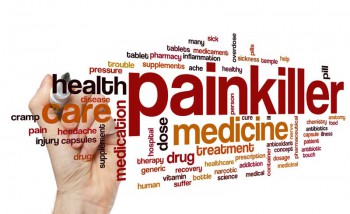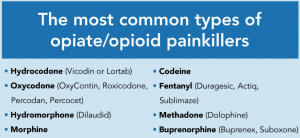Painkiller Addiction

Painkiller addiction is quickly becoming one of the most treated addictions within the drug rehab facilities. Although some people start using painkillers as a recreational drug, many people who are addicted to prescription drugs came by their addiction quite innocently after being prescribed painkillers following an injury or surgery of some type to help them relieve their pain. But, regardless of how one develops a painkiller addiction, the important thing is identifying the problem and getting help. This article offers information on the most popular painkillers, and the warning signs of an addiction. In our next post we will cover what withdrawal symptoms to expect, and what painkiller addiction treatment consists of.
Painkillers
The most common definition of a painkiller is “An analgesic drug, that relieves pain”. One of the problems is that although these drugs relieve pain they are also very addicting and a persons body starts to view this euphoric state as normal and craves it when it doesn’t get it. Another problem is the body builds up a tolerance to the painkiller over a period of time requiring the person to take more and more of the drug in order to get the same effects. The amount quickly surmounts to more than a doctor wants to prescribe which creates a plethora of issues we won’t get into in this article. Some of the most common addictive painkillers include:
- Fentanyl – Available as a lozenge, injectable solution, or skin patch.
- Stadol – Available as a nasal spray or injectable solution.
- OxyContin – Available as a tablet.
- Demerol – Available as an oral solution, injectable solution, and oral tablet.
- Hydrocodone – Available as an oral syrup and oral tablet.
- MS Contin – Available as injectable solution, capsule, tablet, and suppository.
- Percocet – Available as capsule, tablet, and oral solution.
- Lorcet – Available as a tablet, capsule, and oral solution.
- Dilaudid – Available as an oral solution, injectable solution, tablet, and suppository.
- Zydone – Available as an oral solution, capsule, and tablet.
Painkiller Addiction Warning Signs –
If you are worried that you may becoming dependent or addicted to your prescription medications, here are a few warning signs you will want to look for:
- You take more painkillers than your doctor recommends
- You are seeing more than one doctor for pain meds
- You use alcohol or other drugs to heighten the effects of your prescription medications
- You take pain meds to deal with issues besides pain, such as anxiety or stress
- Your doctor, friends, or family are concerned about your use of painkillers
Should you find yourself doing any of these things it is important that you be honest with your physician and seek help as soon as possible. If painkiller addiction is caught in the early stages there is a better chance that your doctor can assist you in weaning yourself off of them without requiring a drug rehab center.
In our next post we will offer information on painkiller withdrawal symptoms and painkiller addiction treatment.






